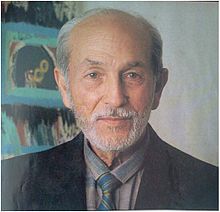Manuel del Cabral
| Manuel del Cabral | |
|---|---|
 |
|
| Born |
Manuel Antonio Cabral Tavárez 7 March 1907 Santiago de los Caballeros, Dominican Republic |
| Died |
14 May 1999 (aged 92) Santo Domingo, Dominican Republic |
| Occupation | Writer |
| Spouse(s) | Alba María Cornero |
| Children | Peggy, Alejandro, Amelia & Chinchina Cabral |
Manuel del Cabral (7 March 1907, in Santiago de los Caballeros, Dominican Republic – 14 May 1999, in Santo Domingo) was a Dominican poet, writer, and diplomat. The son of Mario Fermín Cabral y Báez, an influential senator during the "Era of Trujillo", he served at the Embassy of the Dominican Republic to Argentina. During his long stay in Buenos Aires, he married an Argentine and fathered his 4 children, among them, the television journalist and politician Peggy Cabral. In 1992 he was awarded the Premio Nacional de Literatura.
Cabral has become one of the most celebrated writers of the Dominican Republic, enjoying international fame. His work is most often viewed as an essential representation of Afro-Antillean or Afro-Caribbean poetry, known alternatively as negrismo (blackism or negrism) or poesía negra (black poetry) in Spanish, along with the works of Cuban Nicolás Guillén and Puerto Rican Luis Palés Matos.
Cabral is known for his vast exploration of themes. Perennial human concerns such as love, death, metaphysics, and war occur throughout his writings. Additionally, social and political issues, especially those involving Antillean and Dominican identity, as well as the exploitation of Afro-Caribbeans are prominent in his writings.
Cabral first gained recognition with Compadre Mon (1943), often considered the best example of a Dominican Epic.Compadre Mon, like Trópico Negro and other major works, center around themes of labor and social injustice.
Manuel del Cabral was ambassador to the United States, Peru, Colombia, Brazil, Chile, Spain and Argentina. In the late 1950s he defected and sought political asylum in Argentina, where he lived for 17 years with his family.
...
Wikipedia
